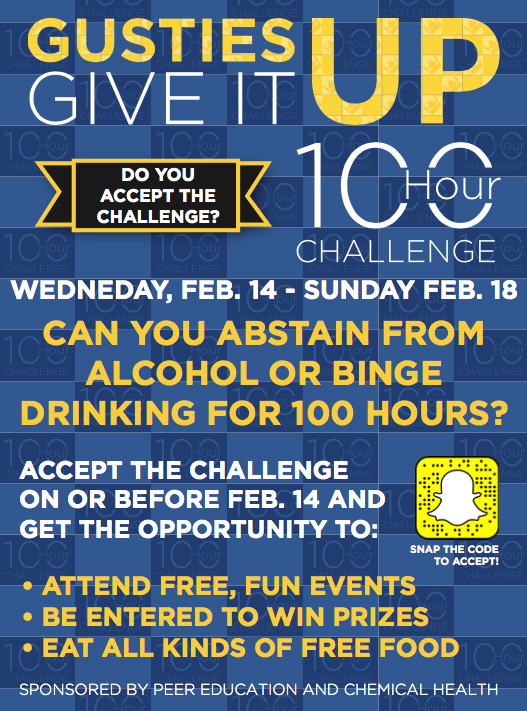Last weekend, 21 percent of the Gustavus student population vowed to go 100 hours without drinking.
The goal was to invite students to abstain from binge drinking to focus on how much of an impact it has on student health.
The event was sponsored by the Peer Assistants, as well as Peer Education and Chemical Health.
“A common misconception is that the 100 Hour Challenge means no drinking at all, but it just means no binge drinking,” Senior Peer Assistant Torin Anderson said.
According to Director of Peer Education and Chemical Health, Laura Herbst-Johnson, “this idea actually originated from the University of Colorado several years ago when the basketball team pledged to abstain from alcohol for one weekend in honor of their coach who had lost his wife and children to a drunk driver. It later spread to a campus-wide initiative that has continued today.”
She says that the health educators at Gustavus work towards being proactive instead of reactive to prevent crisis from happening.
As of February 14, 462 students had officially accepted the challenge, including many Collegiate Fellows on campus.
“I think seeing the CFs be so supportive of something like this can set the mood for future CFs and future leaders on campus,” said Junior CF Hannah Kerber.
Students could take part in events happening on campus put on to emphasize that alcohol is not needed to have a good time.
“I hope that people… realize that there are fun things to do without drinking involved. And that maybe they can consider going to more campus activities or just doing other things,” said Kerber said.
Students tabled outside of the caf last week to support and advertise the challenge and get people involved in 100 hours of no binge drinking.
“We don’t necessarily want to “convince” students to take part in it, but rather provide a well-planned opportunity full of events and activities, in hopes they’ll make the decision to participate for their own reasons or benefit,” said Herbst-Johnson.
“One way that we hope it affects the Gustavus community is that it will help students realize that it is possible to drink alcohol in a way that doesn’t involve binging,” Anderson said.
Students from all backgrounds and interests took part, and many got their picture put up in the campus center advertising the event, including many members of the choirs and students in sports.
“This event is also an effort to support our students who already make healthy choices about alcohol,” Herbst-Johnson said.
Studies show that the priorities of college students are affected by drinking. Many students’ mental health, stress, sleep, and academic health are affected by binge drinking.
“If nothing else, we hope this challenge will help students to recognize the impact binge drinking may have on their successes or struggles in these meaningful aspects of their lives,” Herbst-Johnson said.
According to a survey done by the NIAA in 2015, about 60% of college students drank in the course of one month, while 2 out of 3 of them engaged in binge drinking in the same timeframe.
“Promoting a campus-wide challenge offers a reason for students to step back and consider the role alcohol plays in their lives,” said Herbst-Johnson.
The NIAA defines binge drinking as a pattern of drinking that brings blood alcohol concentration (BAC) levels to 0.08. This typically occurs after 4 drinks for women and 5 drinks for men—in about 2 hours.
It is estimated that each year, about 1,825 college students between the ages of 18 and 24 die from alcohol-related unintentional injuries, including motor-vehicle crashes.
College students are advised to track the number of drinks they consume over a given period of time in order to avoid binge drinking.
“I am a firm believer in educating students holistically, and that includes not only making students aware of the negative implications related to alcohol, but also teaching them harm reduction strategies so if they do choose to drink, it can be done with less risk involved,” Herbst-Johnson said.
“At the end of the day its as much about changing the climate on campus as it is about a personal thing… If you want to ignite change, you have to take up the challenge yourself,” Kerber said.
In the end, the Gustavus community has been informed of the consequences of binge drinking
and hopefully will make good decisions regarding alcohol.
